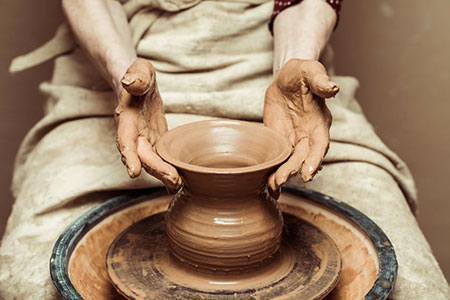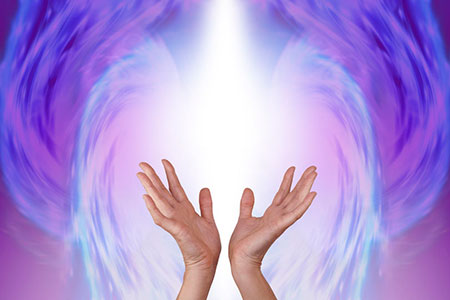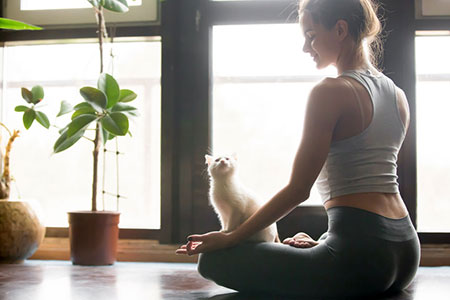inner strength
Spiritual Attachment And Detachment
 The physical world is not the only realm in which some of us struggle with issues of detachment (alienation), or attachment (codependency). The same holds true in the spirit realms.
The physical world is not the only realm in which some of us struggle with issues of detachment (alienation), or attachment (codependency). The same holds true in the spirit realms.
If we experience spiritual attachment, this usually happens as a result of an addictive personality. In life, one could be addicted to unhealthy relationships, various substances, shopping, food, and so on. The driving force behind all of these is basically the same – the attempt to fill a perceived void with a substitute.
This inclination can then lead to the presence of negative spirit attachments with addictive energies. Perhaps the spirit entity had the same kind of addiction when it was in physical form, and still needs to experience that ‘high.’
When this happens, the victim in the physical world, to whom the spirit entity has attached itself, may become more stubborn and in denial over the need to change their habits. Many friends and family members who have had to deal with addicts, will tell you that addiction changed their loved one’s personality. From a spiritual perspective this is very true.
Spiritual detachment, on the other hand, happens when someone is the victim of abuse or trauma. A part of themselves ‘detaches’ or becomes distant from their core self, which may unintentionally invite a more powerful spirit presence to enter, to ‘protect’ or ‘guide’ the victim. Aristotle’s phrase ‘nature abhors a vacuum’ comes to mind. It means every space or void in nature always needs to be filled with something. The same holds true in the spirit realm.
How To Be Patient In Times Of Crisis
 Just about every day, we face some sort of obstacle, delay in communication, or a situation that doesn’t go our way. And in times of an unexpected crisis, our first response is too assume the worst, or panic.
Just about every day, we face some sort of obstacle, delay in communication, or a situation that doesn’t go our way. And in times of an unexpected crisis, our first response is too assume the worst, or panic.
Negative feelings can creep up and overtake the mind, sending us into fits of rage, sadness or disillusionment, due to the lack of patience in surrendering our control and allowing those emotions to pass with total acceptance.
When we become impatient, our entire being is out of balance and the auric energy field becomes muddy and chaotic. Agitation and strain then become the primary motivator, and there is a loss of self-awareness within.
Impatience never makes things happen faster, or better, and the worst way this can manifest is when we try to force an issue, or get a person to instantly say yes, or go along with our vision.
Whenever impatience or uncomfortable feelings arise, it’s vital to make a conscious effort to redirect that negativity and nip it in the bud, so you can stay calm during the toughest times. Here are some strategies to help alleviate impatience when your feeling triggered.
Breathing
Take several deep breaths from your stomach and exhale out the stress, focusing on your third eye as you release your breath. Think of something funny or inspirational so you don’t unleash unnecessary aggression.
Home Is Still Where The Heart Is
 This is a traumatic, stressful time in history for many of us, especially since there is so much confusing news and information to process and assimilate. We can, however, do a number of things during this extremely stressful period to make our lives easier, instead of cowering under the bed until it all blows over. Most importantly, we can choose to face reality with gratitude, courage and fortitude.
This is a traumatic, stressful time in history for many of us, especially since there is so much confusing news and information to process and assimilate. We can, however, do a number of things during this extremely stressful period to make our lives easier, instead of cowering under the bed until it all blows over. Most importantly, we can choose to face reality with gratitude, courage and fortitude.
There should be precautions put into place certainly, but also there should be some joy and happiness, as well as planning for the future. We should be taking advantage of this blissful and happy downtime inside the place where we usually love, hope and live – inside our personal domicile, our home.
Never before have we had such ample opportunity to get to know our loved ones in a more intimate and connected way. Never before have we been reminded so deeply of the many reasons we have to be thankful for. This is a unique time in our lives, during which we can teach our children, as well as each other, that what appears to be a bleak and dire moment can certainly be turned around and changed into one of joy, appreciation and merriment.
Instead of sitting around feeling miserable, many parents have, for example, been contriving makeshift toys, contraptions and activities to help children continue to be happy and carefree, as they should be, whether it be indoors, or in their own backyard.
There are also many adults who are taking advantage of this ‘alone time’ to reconnect, not only with others whom they may have been unintentionally neglecting, but also getting to know and understand themselves on a deeper level.
Simple Self-Care To Improve Your Well-Being
 We are living in stressful times, but this can also be a time of reflection, and looking into the future, making plans. If you are currently feeling depressed, or in despair, there are many simple things you can do to ease your mind, or lift your spirits.
We are living in stressful times, but this can also be a time of reflection, and looking into the future, making plans. If you are currently feeling depressed, or in despair, there are many simple things you can do to ease your mind, or lift your spirits.
To begin, take some time to reflect on how you are feeling. Often we are unaware of how things are really affecting us. Consider how you may be choosing to perceive things, and whether you need to take some time to truly process some of your thoughts and feelings. Just recognizing that you are sad, afraid, frustrated, or depressed, is already a step in the right direction.
Remind yourself also that some of your thoughts and feelings may not be unusual in these unusual circumstances. Many people are going through the same thing at the moment. You are definitely not alone.
Each of us react differently to unpleasant life events. Try to stay positive and not be so down on yourself. Try to be more proactive and take time to reflect on what is most important in your life. Meditation, and other forms of spiritual practice, is a great way to relieve stress in your life.
Inviting The Comfort Of Angels
 Now, more than ever before in our lifetime, angels are here to support, guide and comfort us in these challenging times. Angels always show up during times of great calamity and crisis. Many angel sightings or experiences have been witnessed during traumatic periods throughout human history. It is important to remember that they are ever-present, and waiting to be of service, love and support.
Now, more than ever before in our lifetime, angels are here to support, guide and comfort us in these challenging times. Angels always show up during times of great calamity and crisis. Many angel sightings or experiences have been witnessed during traumatic periods throughout human history. It is important to remember that they are ever-present, and waiting to be of service, love and support.
Over the years, I have seen time and time again that some of the key primary purposes of the angels in our lives is to remind and reinforce for us that we are not alone; that we can and will overcome the challenges we face at the moment; and to link us back to the best part of our hearts, which is where our true strength lies. It is that part of us which they hold sacred for us.
The angels have known us since before we were born. They have been watching over us as we have gone through triumph and tragedy, ever-vigilant, always supportive, they are loving and guiding us with signs and feelings towards our hearts desire. Through it all they remain unwavering in their faith in our ability to rise to the full expression of our hearts in all of life’s circumstances.
They are friend to all, regardless of our diverse beliefs and sometimes misguided dogmas. They truly are here to serve all of humankind. More often than not they are subtle in their presence, and their voices come through in feelings of comfort, love, and peace. They also guide us with a deep sense of knowing that a course of action we are about to embark on is either advantageous, or dangerous. They are never judge nor jury; they are always our advocates without question.
When Too-Close-For-Comfort Reveals The Truth
 So, here is something new, which I have not heard before in my work: distraught clients asking for help while quarantined with their partner or spouse. For some, being cooped up with their significant other is apparently not going very well!
So, here is something new, which I have not heard before in my work: distraught clients asking for help while quarantined with their partner or spouse. For some, being cooped up with their significant other is apparently not going very well!
The circumstances that we are all going through at the moment, is forcing us to take another look at our closest relationships and see if they are meant to be long lasting, or if it is only a chapter or season in our life. Some relationships start off wonderful like a TV commercial, one minute it is heavenly, and then one day not so much.
So, let me share a recent Tarot reading I did for a gentleman, who said it helped them a lot during this too-close-for-comfort time at home with his wife. Who knows, maybe it will be of value to you too? It might just rescue your mental health, happiness and well-being…until they let the two of you out of the house again.
He said that he is a great problem-solver, but just can’t figure out how to make this marriage work. He never saw certain aspects of his wife’s personality, until he has now been forced to have to be around her for a very long extended period of time during the Covid-19 lockdown. He also admitted that sometimes it’s hard to really connect his feelings to things going on in his life, only because he “can be moody.” But we soon discovered the real truth about his toxic relationship.
In the reading, I saw that he has had many relationships in his life and he acknowledged that he had been married several times. I said that I felt it did not work out because he didn’t get the necessary support he needed from his mates in the past.
